人教版英语八下Unit 3《Could you please clean your room》课件1
2024八年级英语下册Unit3Couldyoupleasecleanyourroom单元主题写作习
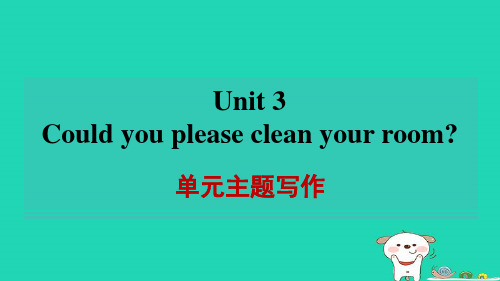
Unit 3 Could you please clean your room?
单元主题写作
一、话题分析 本单元以“家务与许可(chores and permission) ”为
话题, 围绕家庭中的日常事务展开。
二、素材积累 (一)“做家务” 类话题常用的词汇: do the dishes // take out the rubbish // fold the clothes // sweep the floor // make the bed // clean the living room // do the housework // share the housework // look after/take care of
中间句 1. She came home from work and found the house clean
and tidy. 2. I understand that we need to share the housework with
our parents. 3. Housework isn’t a waste of time for students.
(三) 名言警句 1. Labor can arouse people’s creativity.
劳动能唤起人的创造力。 2. Practice makes perfect.
熟能生巧。
(四) 句子升格 1. We should do the housework. (用It is. . . to. . . 升格
____M__y__m__o_th__er___h_a_d__s_o_m__e_th_i_n_g__i_m__p_o_r_ta_n_t___to___d_o__l_a_st_ _S_u_n_d_a_y__a_n_d__w_o_u_l_d_n_’_t_g_e_t_b_a_c_k__h_o_m__e_u_n_t_i_l _5_:0_0__p_._m_._, _s_o_I_ _d_e_c_id_e_d__t_o_d_o__th__e_c_h_o_r_e_s_a_n_d__g_iv_e__h_e_r_a_s_u_r_p_r_i_s_e._________ ____I_n_t_h_e__m_o_r_n_i_n_g_,_I_q__u_ic_k_l_y_f_i_n_is_h_e_d__m_y__h_o_m__e_w_o_r_k__a_n_d_ _b_e_g_a_n__to__w_a_s_h__th_e__d_is_h_e_s_.____________________________
英语人教版八年级下册Unit-3-Could-you-please-clean-
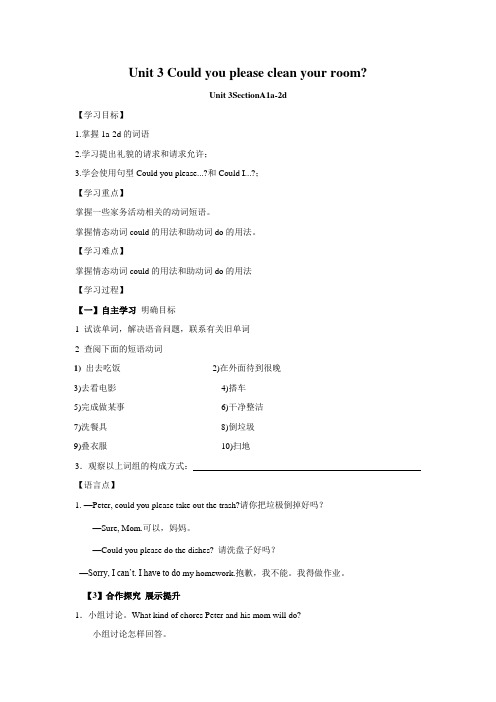
Unit 3 Could you please clean your room?Unit 3SectionA1a-2d【学习目标】1.掌握1a-2d的词语2.学习提出礼貌的请求和请求允许;3.学会使用句型Could you please...?和Could I...?;【学习重点】掌握一些家务活动相关的动词短语。
掌握情态动词could的用法和助动词do的用法。
【学习难点】掌握情态动词could的用法和助动词do的用法【学习过程】【一】自主学习明确目标1 试读单词,解决语音问题,联系有关旧单词2 查阅下面的短语动词1) 出去吃饭_______________ 2)在外面待到很晚_______________3)去看电影_______________ 4)搭车_______________5)完成做某事_______________ 6)干净整洁_______________7)洗餐具_______________ 8)倒垃圾_______________9)叠衣服_______________ 10)扫地_______________3.观察以上词组的构成方式:【语言点】1. —Peter, could you please take out the trash?请你把垃极倒掉好吗?—Sure, Mom.可以,妈妈。
—Could you please do the dishes? 请洗盘子好吗?—Sorry, I can’t. I have to do my homework.抱歉,我不能。
我得做作业。
【3】合作探究展示提升1.小组讨论。
What kind of chores Peter and his mom will do?小组讨论怎样回答。
2.小组活动编对话3.听力:先阅读2a题中Peter的父亲拒绝的理由。
然后听2a, 2b。
完成练习并核对答案。
4.小组合作做2c。
5.分角色表演2d, 小组讨论解决疑难问题。
人教版英语八年级下册Unit 3听力原文及翻译
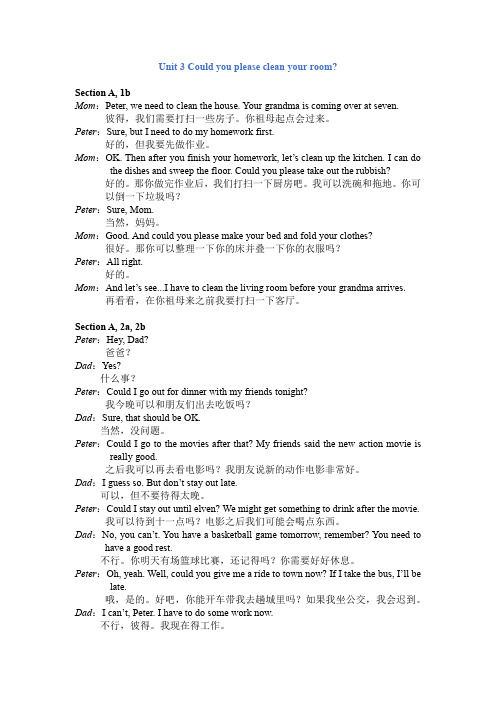
Unit 3 Could you please clean your room?Section A, 1bMom:Peter, we need to clean the house. Your grandma is coming over at seven.彼得,我们需要打扫一些房子。
你祖母起点会过来。
Peter:Sure, but I need to do my homework first.好的,但我要先做作业。
Mom:OK. Then after you finish your homework, let’s clean up the kitchen. I can do the dishes and sweep the floor. Could you please take out the rubbish?好的。
那你做完作业后,我们打扫一下厨房吧。
我可以洗碗和拖地。
你可以倒一下垃圾吗?Peter:Sure, Mom.当然,妈妈。
Mom:Good. And could you please make your bed and fold your clothes?很好。
那你可以整理一下你的床并叠一下你的衣服吗?Peter:All right.好的。
Mom:And let’s see...I have to clean the living room before your grandma arrives.再看看,在你祖母来之前我要打扫一下客厅。
Section A, 2a, 2bPeter:Hey, Dad?爸爸?Dad:Yes?什么事?Peter:Could I go out for dinner with my friends tonight?我今晚可以和朋友们出去吃饭吗?Dad:Sure, that should be OK.当然,没问题。
Peter:Could I go to the movies after that? My friends said the new action movie is really good.之后我可以再去看电影吗?我朋友说新的动作电影非常好。
人教版八年级下英语Unit 3 Could you please cleanyourroom知识总结
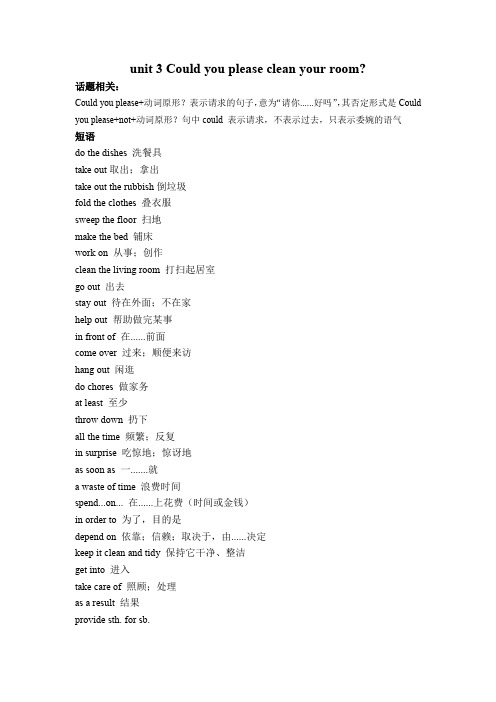
unit 3 Could you please clean your room?话题相关:Could you please+动词原形?表示请求的句子,意为“请你......好吗”,其否定形式是Could you please+not+动词原形?句中could 表示请求,不表示过去,只表示委婉的语气短语do the dishes 洗餐具take out取出;拿出take out the rubbish倒垃圾fold the clothes 叠衣服sweep the floor 扫地make the bed 铺床work on 从事;创作clean the living room 打扫起居室go out 出去stay out 待在外面;不在家help out 帮助做完某事in front of 在......前面come over 过来;顺便来访hang out 闲逛do chores 做家务at least 至少throw down 扔下all the time 频繁;反复in surprise 吃惊地;惊讶地as soon as 一.......就a waste of time 浪费时间spend...on... 在......上花费(时间或金钱)in order to 为了,目的是depend on 依靠;信赖;取决于,由......决定keep it clean and tidy 保持它干净、整洁get into 进入take care of 照顾;处理as a result 结果provide sth. for sb.=provide sb. with sth. 为某人提供某物a developed country 一个发达国家a developing country 一个发展中国家a life of independence 独立的生活an independent country 一个独立自主的国家have no idea “不知道”=don't knowtake care of “照顾;处理”=look after=care for take good care of “好好照顾......”=look after.....well as a result 结果;因此as a result of 由于.......;作为......结果句型和固定结构finish doing sth. 做完某事neither+连系动词be/助动词/情态动词+主语. .....也不hate to do sth. 厌恶做某事let sb. do sth. 让某人做某事spend...doing sth. 花费......做某事provide sth. for sb. 向某人提供某物learn to do sth. 学会做某事learn how to do sth. 学会怎样做某事do one's part in (doing) 尽自己的职责做某事as.....as... 与.......一样not as/so...as... 不如......borrow sth. from sb. “向某人借某物”hate sb./sth. 讨厌某人/某物hate to do sth./doing sth. 厌恶做某事enjoy doing sth 喜欢做某事buy sb.sth.=buy sth. for sb. "给某人买某物invite sb. to +地点名词“邀请某人到某地”invite sb. to do sth. “邀请某人做某事”make sb. do sth. 让/使某人做某事help with sth. =help (to) do sth.帮忙做某事There is no need for sb. to do sth.“对于某人来说,没有必要做某事”解释minute n.分钟;片刻(1)any minute now “随时;马上;在任何时刻”,表示事情有可能在极短的时间内发生或眼下就要发生。
英语人教版八年级下册Unit3 Could you please clean

Unit3 Could you please cleanyour room?教学目标知识技能1.Key words: chore, trash, fold, dish, living room, sweep, do the dishes, do chores, take out the trash.2.Target Language;Could you please sweep the floor? Yes, sure.过程方法According to designing some tasks, train students’ listening skill and speaking skill.情感态度Remember to be polite when you ask for help, and to be a good child. 教学重点1.Key words: chore, trash, fold, dish, living room, sweep, do the dishes, do chores, take out the trash.2. Target LanguageCould you please sweep the floor? Yes, sure.教学难点Target Language教学用具A tape recorder ,CAI教学内容Step 1 : Warm-up1. Greetings.2. Show students some pictures about chores, ask one student to help the teacher put them up on the blackboard. Then ask students if there is a more polite way to ask for help.Give students sample sentences, eg: Please help me put up the pictures on the blackboard.Step2.Presentation1 Show pictures to present new words.clean the room do the dishes sweep the floor make the bed take out the trash fold the clothes Write the phrases on the blackboard and ask students to guess the meaning of them. Then ask the students to read the new phrases and match them with the pictures.2 Ask students to do a memory game. Show students pictures quickly then cover them and ask students to say what chores they saw.3 Ask: Who does most of the chores at home? Your mother is tired after work every day. On Sunday she wants you to help her. What does she say to you ? What do you say ? A: Could you please clean the living room?B: Yes, sure./ All right/ OK./A: Could you please sweep the floor?B: Sorry , I can’t. I have to do my homework.Write the sentences on the blackboard and ask students to look at the pictures and ask their partner to do the chores that they see.4 Activity 1bAsk students to listen to a conversation, then answer: What chores does mom do? What chores does Peter do? And finish the chart.Check the answers with the students.Step3 Consolidation and extensionShow students more phrases about chores, such as: cook the dinner, clean the bedroom, help mother do some shopping, wash the car, ask students to make richer conversations according to Activity 1b.Step4 SummaryRemember the key words and the target language.作业设计Work in pairs use the target language.板书设计Unit 3 Could you please clean your room? Period 1clean the room do the dishes sweep the floormake the bed take out the trash fold the clothes Could you please sweep the floor? Yes,sure.。
人教版英语八年级下册Unit3《Couldyoupleasecleanyourroom》说课稿
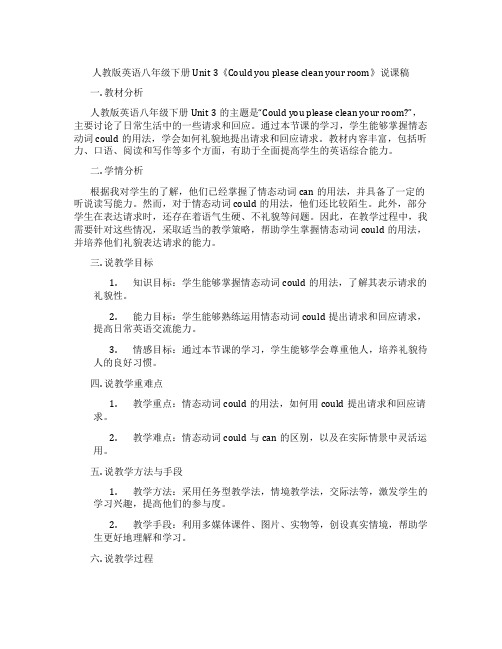
人教版英语八年级下册Unit 3《Could you please clean your room》说课稿一. 教材分析人教版英语八年级下册Unit 3的主题是“Could you please clean your room?”,主要讨论了日常生活中的一些请求和回应。
通过本节课的学习,学生能够掌握情态动词could的用法,学会如何礼貌地提出请求和回应请求。
教材内容丰富,包括听力、口语、阅读和写作等多个方面,有助于全面提高学生的英语综合能力。
二. 学情分析根据我对学生的了解,他们已经掌握了情态动词can的用法,并具备了一定的听说读写能力。
然而,对于情态动词could的用法,他们还比较陌生。
此外,部分学生在表达请求时,还存在着语气生硬、不礼貌等问题。
因此,在教学过程中,我需要针对这些情况,采取适当的教学策略,帮助学生掌握情态动词could的用法,并培养他们礼貌表达请求的能力。
三. 说教学目标1.知识目标:学生能够掌握情态动词could的用法,了解其表示请求的礼貌性。
2.能力目标:学生能够熟练运用情态动词could提出请求和回应请求,提高日常英语交流能力。
3.情感目标:通过本节课的学习,学生能够学会尊重他人,培养礼貌待人的良好习惯。
四. 说教学重难点1.教学重点:情态动词could的用法,如何用could提出请求和回应请求。
2.教学难点:情态动词could与can的区别,以及在实际情景中灵活运用。
五. 说教学方法与手段1.教学方法:采用任务型教学法,情境教学法,交际法等,激发学生的学习兴趣,提高他们的参与度。
2.教学手段:利用多媒体课件、图片、实物等,创设真实情境,帮助学生更好地理解和学习。
六. 说教学过程1.导入:通过播放一段关于孩子们日常生活的视频,引出本节课的主题“Could you please clean your room?”。
2.新课呈现:介绍情态动词could的用法,并通过例句展示如何用could提出请求和回应请求。
2017人教新目标版英语八下Unit 3《Could you please clean y

第三课时 Grammar Focus-Section B 1e (P20-21)
-.
课前预习
【单词】 1. 递;通过v.______p_a_s_s____ 2. 借用v._____b_o_r_r_o_w____ 3. 借出v._______l_e_n_d____ 4. 手指n. _____f_i_n_g_e_r___ 5. 讨厌v._____h_a_t_e____ 6. 杂务n. ____c_h_o_r_e_____ 7. 当…时候;然而conj.____w_h_i_l_e___ 8. 小吃n. ____s_n_a_c_k_____
C. no talk
D. not to talk
( B ) 2. -Could you please look after my
dog when I am away?
- ________.
A. You’re welcome B. With pleasure
C. It doesn’t matter D. Good idea
C. Sorry, I won’t D. Sorry, I can’t
课后作业
一、单项选择
(B ) 1. Could you please_____________
loudly here? Everyone else is doing
homework quietly.
A. don’t talk
B. not talk
课堂小测
一、根据中文意思或首字母提示,用单词的适当 形式填空,每空一词。 1. Everyone has ten ____f_i_n_g_e_r_s___ (手指). 2. ____P_a_s_s___(递) me the pepper, please, my boy. 3. Could you please__l_e_n_d____ (借) me an umbrella? 4. I hate some ___c_h_o_r_e_s___(杂务), such as doing the dishes. 5. I have no idea why I hate eating ____s_n_a_c_k_s____ (小吃) so much.
Unit3Couldyoupleasecleanyou八年级英语下册单元话题满分写作(人教版)含答案

答卷时应注意事项1、拿到试卷,要认真仔细的先填好自己的考生信息。
2、拿到试卷不要提笔就写,先大致的浏览一遍,有多少大题,每个大题里有几个小题,有什么题型,哪些容易,哪些难,做到心里有底;3、审题,每个题目都要多读几遍,不仅要读大题,还要读小题,不放过每一个字,遇到暂时弄不懂题意的题目,手指点读,多读几遍题目,就能理解题意了;容易混乱的地方也应该多读几遍,比如从小到大,从左到右这样的题;4、每个题目做完了以后,把自己的手从试卷上完全移开,好好的看看有没有被自己的手臂挡住而遗漏的题;试卷第1页和第2页上下衔接的地方一定要注意,仔细看看有没有遗漏的小题;5、中途遇到真的解决不了的难题,注意安排好时间,先把后面会做的做完,再来重新读题,结合平时课堂上所学的知识,解答难题;一定要镇定,不能因此慌了手脚,影响下面的答题;6、卷面要清洁,字迹要清工整,非常重要;7、做完的试卷要检查,这样可以发现刚才可能留下的错误或是可以检查是否有漏题,检查的时候,用手指点读题目,不要管自己的答案,重新分析题意,所有计算题重新计算,判断题重新判断,填空题重新填空,之后把检查的结果与先前做的结果进行对比分析。
亲爱的小朋友,你们好!经过两个月的学习,你们一定有不小的收获吧,用你的自信和智慧,认真答题,相信你一定会闯关成功。
相信你是最棒的!2021-2022八年级英语下学期单元话题满分写作Unit 3:Could you please clean your room?单元话题:家务劳动范文11.(2021·广东·阳西县教育局教学研究室八年级单元测试)请你根据提示及要求,以Let’s help our parents do chores为题,写一篇英文倡议书。
要点提示:(1)父母工作繁忙,我们应该分担家务;(2)我们可以做的家务有:整理床铺、打扫房间,洗衣服,洗餐具、倒垃圾等。
写作要求:(1)包括所有要点提示,可适当增加细节,以使行文连贯;(2)80词左右(开头结尾已给出,不计入总词数)。
人教版 八年级英语 下册 Unit3Could_you_please_clean_your_room
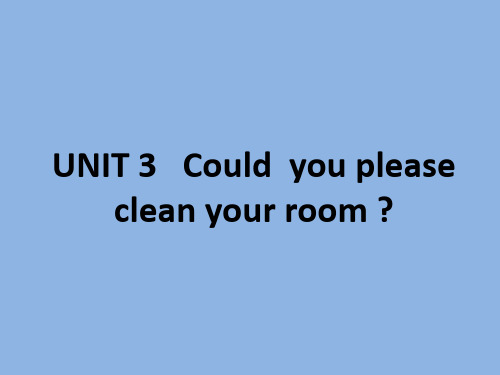
invite my friends to a party
go to the store use your CD player
Listen to a conversation between Sandy
a party? Parent: No, you can’t have a party.
You have a test on Monday.
Parent: Could you please…? Child: Yes, sure. / Sorry, I can’t. I
have to ...
clean your room
parents
5. go to the store 6. use your CD player 7. take out the rubbish
parents 8. make your bed
1b Use the phrases in 1a to make
conversations.
Parent: Could you clean your room? Child: Yes, I can. Child: Could I invite my friends to
Li Lei can’t dance , neither can I. neither can Mary. neither can we.
Neither of …是both of … 的否定句 Both of my parents are teathers .(否定句) Neither of my parents is a teacher .
英语人教版八年级下册Unit3 Could you please clean

1. d 2. a 3. c 4. e 5. b
2. 4b
Fill in the blanks.
3. Make a list of things your group need to do for a camping trip. Then discuss who will do them and complete the chart.
3.学会使用以下句型:
1) Why wasNancy’s mom angry withNancy?
2) You watch TV all the time and never help out around the house.
3) I can’t work all day and do housework all evening.
(4) I’m just as tired as you.
(5) My mom did not say anything and walked away.
(6) Neither of us did any house work for a week.
(7) Could I borrow that book?
1)学习并掌握新词汇:
throw; all the time; neither; shirt; pass; borrow; lend; finger; hate; while
2)能正确使用以下常用表达:
throw down; come over; all the tome; help out; shout back; in surprise; neither of us; as soon as; pass sb. sth.=pass sth. to sb.; borrow sth. from sb.; lend sb. sth.; hate to do sth.
(完整版)英语人教版八年级下册Unit3Couldyouplease--
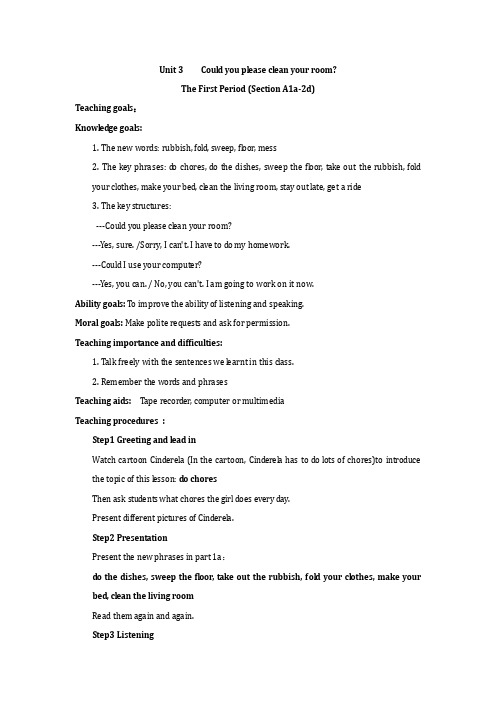
Unit 3 Could you please clean your room?The First Period (Section A1a-2d)Teaching goals:Knowledge goals:1. The new words: rubbish, fold, sweep, fl oor, mess2. The key phrases: do chores, do the dishes, sweep the fl oor, take out the rubbish, foldyour clothes, make your bed, clean the living room, stay out late, get a ride3. The key structures:---Could you please clean your room?---Yes, sure. /Sorry, I can't. I have to d o my homework.---Coul d I use your computer?---Yes, you can. / No, you can't. I am going to work on it now.Ability goals: To improve the ability of listening and speaking.Moral goals: Make polite requests and ask for permission.Teaching importance and difficulties:1. Talk freely with the sentences we l earnt in this class.2. Remember the words and phrasesTeaching aids: Tape recorder, computer or multimediaTeaching procedures :Step1 Greeting and l ead inWatch cartoon Cinderela (In the cartoon, Cinderela has to d o lots of chores)to introduce the topic of this l esson: do choresThen ask students what chores the girl does every day.Present different pictures of Cinderela.Step2 PresentationPresent the new phrases in part 1a:do the dishes, sweep the floor, take out the rubbish, fol d your clothes, make your bed, cl ean the living roomRead them again and again.Step3 ListeningT: Peter’s room is untidy, peter and his mother are at home, what shoul d they d o?1. Now listen to the tape player, then finish part 1b. Peter’s chores or Mom’s chores? Listen it the first time, and check the answers2. Listen it again, then pay attention to the question:T: How does Mum ask peter to help her?----Could you please …?----Yes, sure. / Sorry, I can’t, I have to…Step 4 Pair workLook at the picture in 1a, ask your partner to d o the chores that you see. Example:A: Coul d you please sweep the fl oor?B: Yes, sure. Can you d o the dishes?A: Well, coul d you please do them? I ‘m going to cl ean the living room.B: No problem.Step 5 Listening1. Look through the tasks in 2a and 2b carefully before listening.2. Play the tape the first time, let the students finish part 2a3. Play the tape the second time and let the stud ents finish the tasks 2b.4. Listen to the tape once more and ask the students to repeat after the tape and check the answers by themselves.Question: How to ask for permission?总结请求许可时,常用句型:---Coul d I…?---Yes, you can. / Sorry, you can’t.Step 6 Group workStudent A is Peter, Stud ent B is Peter’s father, Peter asks his father if he can do three more t hings. Say “yes” or “no”, and give a reason. Such as:A: Could I use your computer?B: Sorry. I’m going to work on it now.A : Well, coul d I watch TV?B: Yes, you can. But first you have to clean your roomStep 7 Self-studyAsk the students to learn 2d by themselves and finish the tasks of self-study.1. Let stud ents read the conversation l oudly, then come up with some questions. Thestudent who raises a question will get 2 points. And the student who answers it will get1 point.2. Read it carefully, then find out the new words and difficult points. Let students showthem in class.3. Role-play the conversation in groups.Step 8 Language points1.Tony, could you please help out with a few things?help out (with something) 是一个动词短语, 表示在某人繁忙或是遇到困难时“给予帮助”。
初中英语人教版八年级下册《Unit 3 Could you please clean your ro
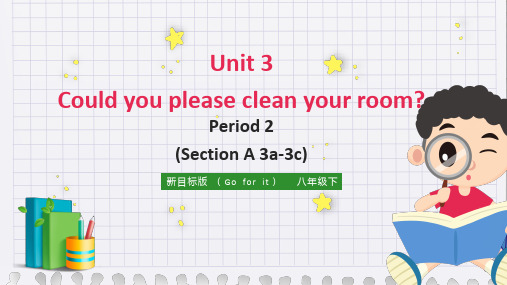
My mom did not say anything and walked away. For one week, she did not do any housework and neither did I. Finally, I could not find a clean dish or a clean shirt. The next day, my mom came home from work to find the house clean and tidy. “What happened?” she asked in surprise. “I’m so sorry, Mom. I finally understand that we need to share the housework to have a clean and comfortable home,” I replied.
Reasons( 理由) do my homework
study for a test visit my friends
Mom: Peter, could you please …? Peter: Yes, sure./Certainly... /Sorry, I can’t . I have to/I’m ...
2. I’m just as tired as you are! as ... as 意为 “和……一样” ,表示同级的比较。 使用时要注意第一个as为副词,第二个as为 连词。其基本结构为:as + adj./ adv. + as。
e.g. This film is as interesting as that one. 这部电影和那部电影一样有趣。 Your pen writes as smoothly as mine. 你的钢笔书写起来和我的一样流畅。
八年级英语下册Unit3《Couldyoupleasecleanyourroom》(讲)(含解析)(新版)人教新目标版
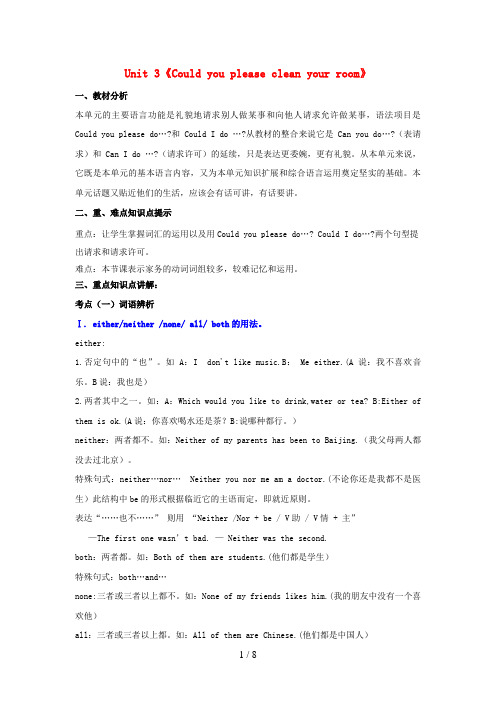
Unit 3《Could you please clean your room》一、教材分析本单元的主要语言功能是礼貌地请求别人做某事和向他人请求允许做某事,语法项目是Could you please do…?和Could I do …?从教材的整合来说它是Can you do…?(表请求)和Can I do …?(请求许可)的延续,只是表达更委婉,更有礼貌。
从本单元来说,它既是本单元的基本语言内容,又为本单元知识扩展和综合语言运用奠定坚实的基础。
本单元话题又贴近他们的生活,应该会有话可讲,有话要讲。
二、重、难点知识点提示重点:让学生掌握词汇的运用以及用Could you please do…? Could I do…?两个句型提出请求和请求许可。
难点:本节课表示家务的动词词组较多,较难记忆和运用。
三、重点知识点讲解:考点(一)词语辨析Ⅰ. either/neither /none/ all/ both的用法。
either:1.否定句中的“也”。
如 A:I don't like music.B: Me either.(A说:我不喜欢音乐。
B说:我也是)2.两者其中之一。
如:A:Which would you like to drink,water or tea? B:Either of them is ok.(A说:你喜欢喝水还是茶?B:说哪种都行。
)neither:两者都不。
如:Neither of my parents has been to Baijing.(我父母两人都没去过北京)。
特殊句式:neither…nor… Neither you nor me am a doctor.(不论你还是我都不是医生)此结构中be的形式根据临近它的主语而定,即就近原则。
表达“……也不……” 则用“Neither /Nor + be / V助 / V情 + 主”—The first one wasn’t bad. — Neither was the second.both:两者都。
人教版八年级英语下册Unit 3 Could you please clean your room

【归纳拓展】order用法小结 (1)order作名词, 意为“命令; 指示; 顺序; 订单”等。例如: Please put these shoes in order. 请把这些鞋子按顺序放好。 (2)order作动词, 意为“命令; 点(菜、饮料等); 订(货); 预订” 等。后接名词作宾语。例如: I just want to order a glass of juice. 我只是想点一杯果汁。
2. I think it is important for children to learn how to do chores and help their parents with housework. 我认为对孩子们来说学习如何做家务和帮助父母做家务是很 重要的。
【自主领悟】本句是一个含有宾语从句的主从复合句, 其句式 结构如下:
5. help with 6. spend time on sth. 7. as a result 8. fall ill 答案: 5. 在某方面帮助; 帮助做某事 6. 花时间做某事 7. 结果是; 因此 8. 生病; 病倒
Ⅱ. 阅读短文, 判断正误(T/F) ( )1. Mr. Smith thinks housework is a waste of time for kids. ( )2. Mr. Smith doesn’t think it’s the parents’ job to provide a clean and comfortable environment at home for children. ( )3. It’s difficult and boring for Mr. Smith to do chores. ( )4. Ms. Miller thinks it’s important for children to learn how to do chores and help with housework. ( )5. Ms. Miller thinks doing chores is helpful for children to develop their independence. 答案: 1~5. TFFTT
人教版八年级英语下册-Unit-3-Could-you-please-clean-your-room-重点词组+重点句型+重点语法+综合练习题
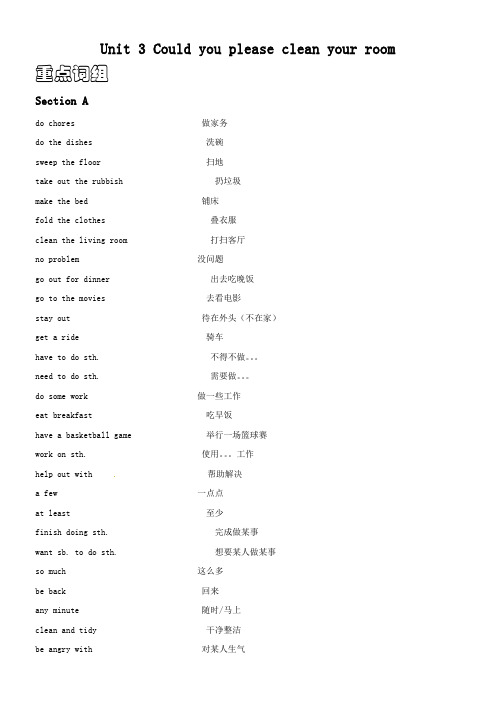
Unit 3 Could you please clean your room 重点词组Section Ado chores 做家务do the dishes 洗碗sweep the floor 扫地take out the rubbish 扔垃圾make the bed 铺床fold the clothes 叠衣服clean the living room 打扫客厅no problem 没问题go out for dinner 出去吃晚饭go to the movies 去看电影stay out 待在外头(不在家)get a ride 骑车have to do sth. 不得不做。
need to do sth. 需要做。
do some work 做一些工作eat breakfast 吃早饭have a basketball game 举行一场篮球赛work on sth. 使用。
工作help out with 帮助解决a few 一点点at least 至少finish doing sth. 完成做某事want sb. to do sth. 想要某人做某事so much 这么多be back 回来any minute 随时/马上clean and tidy 干净整洁be angry with 对某人生气solve the problem 解决问题throw down 扔下in front of 在。
前面come over 过来take...for a walk 带。
去散步all the time 一直all day 整个白天do housework 做家务all evening 整个夜晚shout back 吼叫还击walk away 走开come home from work 下班回家in surprise 惊讶地share the housework 分担家务sit down 坐下hang out 出去玩help sb. (to) do sth. 帮助某人做某事how much 多少come back 回来try (not) to do sth. 努力(不)做某事hate to do sth. 讨厌做某事Section Bask sb. to do sth. 让某人做某事next to 靠近have a party 参加派对have a test 参加考试mean doing sth. 意味着。
- 1、下载文档前请自行甄别文档内容的完整性,平台不提供额外的编辑、内容补充、找答案等附加服务。
- 2、"仅部分预览"的文档,不可在线预览部分如存在完整性等问题,可反馈申请退款(可完整预览的文档不适用该条件!)。
- 3、如文档侵犯您的权益,请联系客服反馈,我们会尽快为您处理(人工客服工作时间:9:00-18:30)。
pleasure
• It is my pleasure/It is a pleasure不用谢--对 thank you的回答 • With pleasure 乐意为您效劳
• Nancy: • Thanks for taking care of my dog. Could you please do these things every day? Take him for a walk. Give him water and feed him. Then wash his bowl. Play with him. Don’t forget to clean his bed. Have fun! • See you next week. • Thanks, • Thomas
feed (v)
接受邀请
喂养;饲养; 抚育 Care about I don’t care about it!
feed-fed-fed
player (n)
喂养;饲养;
唱片机;运 动员
Care for
关心
care (n; v) Take care= be careful=look out Take care of= look after Careful (a) Careless (a) Care about I don’t care about it! Care for
小心;照顾 当心! 照顾;照料 谨慎的;细心的 粗心的 在乎;在意 我才不管它呢! 关心
• “当心!” 当他经过这个门时,老师大喊 • “take care! Look out! Be ___!” the teacher cried out when he passed the gate. • 他是一个细心的人,而他的弟弟是一个粗心的 人 • He is ___ while his brother is ___ • 他小心地进入屋子为了不吵醒他的孩子 • He entered the room the room _____for not waking up his kid
词组总结
1. 2. 3. 4. 5. 6. 7. 8. 9. Thanks for doing… Thank sb for … Take care of… Could you please do..? Would you like to do..? Go out for a walk Feed somebody Play with sb Don’t forget to do… 1. 2. 3. 4. 5. 6. 7. 8. 9. 感谢做某事 感谢某人某事 照顾 你愿意做...吗? 你愿意做...吗? 出去散步 喂养… 和某人玩 别忘记做…
折叠 起居室
忙于 算出;制订出 恨 洗衣店 小吃 十几岁的人
Take care 小心! Take care of 照顾;照料
do the laundry 洗衣服 wash clothes 洗衣服 borrow. .from.. 借来…从… lend…to… invite (v) invitation (n) 借出…给.. 邀请 邀请
掌握本课重点词
“意愿类”的总结
情绪词的变化
chore (n)
杂事;日常工作
Take time
花费时间
dish (n) do the dish sweep (v) swept trash (n)
Take out Take off Take a message Take a seat
盘子;飞碟 洗餐具 清扫;打扫
I am surprised to the bad result.
The result surprised me.
• . This is an ___ game that I watch. • surprising/ surprised/ exciting/ excited • . The boy who sits before me is so __ to the game playing on TV. • surprising/ interested/ exciting/ excited • . The end __ me. • surprised/ surprising/ is surprising/ is surprised to • 分析; • 我感到刺激对于这个电影—人+feel+….ed+介词+物 • 这个电影让我感到刺激—物+ surprise +人(surprise 是动词)
care (n; v)
小心;照顾
Take care= be careful=look out Take care of= look after Careful (a)
Careless (a)
当心!
照顾;照料 谨慎的;细心 的 粗心的 在乎;在意 我才不管它 呢!
accept your invitation
• • • • • • •
.翻译下面句子 我觉得这个游戏有趣 这个游戏让我觉得有趣 这是个有趣的游戏 I feel interested in the game. The game interests me. This is an interesting 表示乐意时,please 后跟v原 • 句型: Would you please do…?(请与其他结构详 细区分) • 2. please (v)让某人高兴 • 例: The game pleases me. • Please---pleased人---pleasant 让人高兴的 • 例It is a pleasant place这是个让人愉快的地方 • 例I am pleased.我很高兴 (主语必须是人,常配 with)
垃圾;废物
Take one’s place Take turns
make one’s bed
代替某人位置
轮流 整理床铺
取出 Take sb to… 把某人带到.. 脱衣服;拖延 捎口信 坐下
fold (v) living room
Work on Work out hate (v) laundry (n) snack (n) teenager (n)
